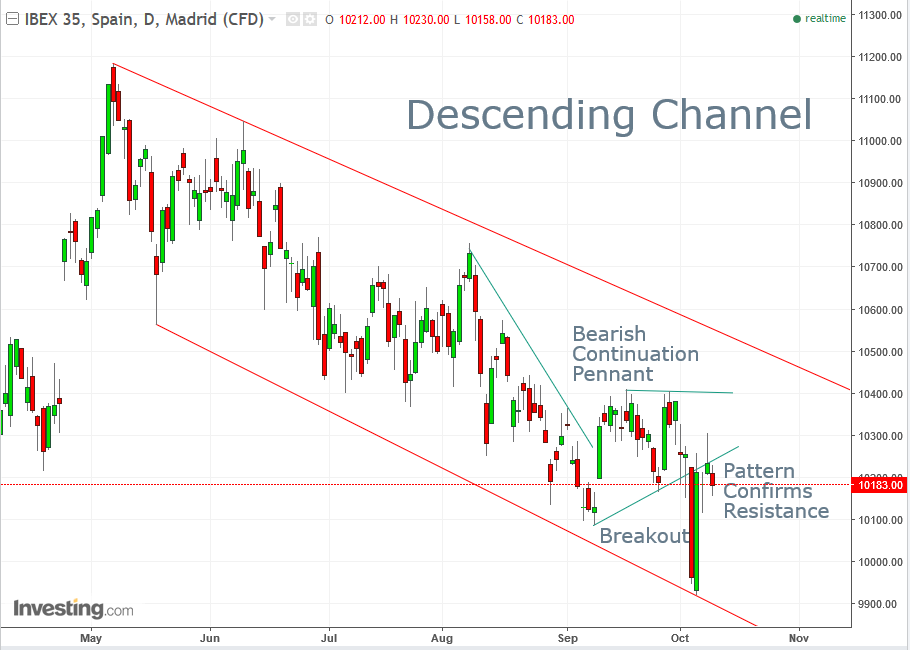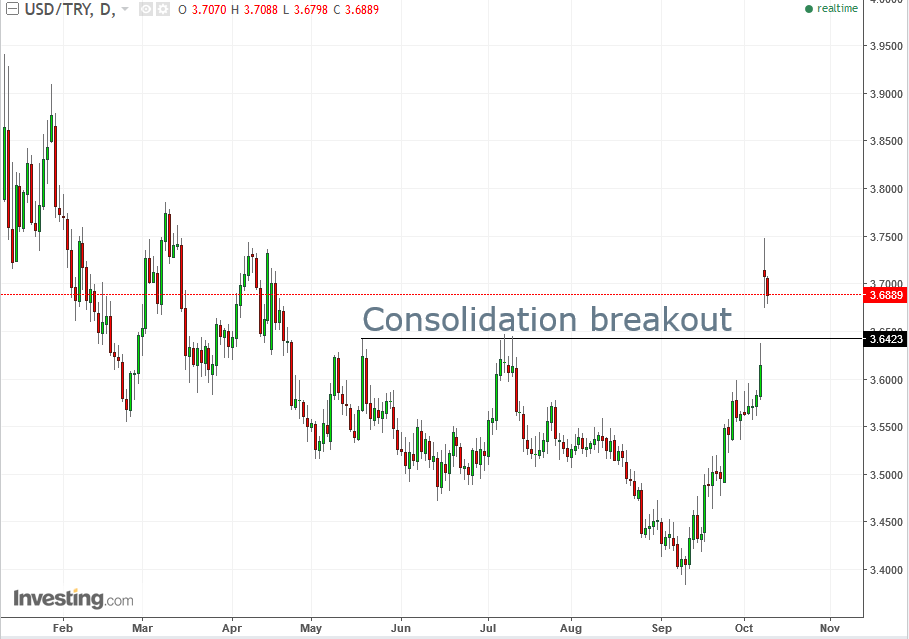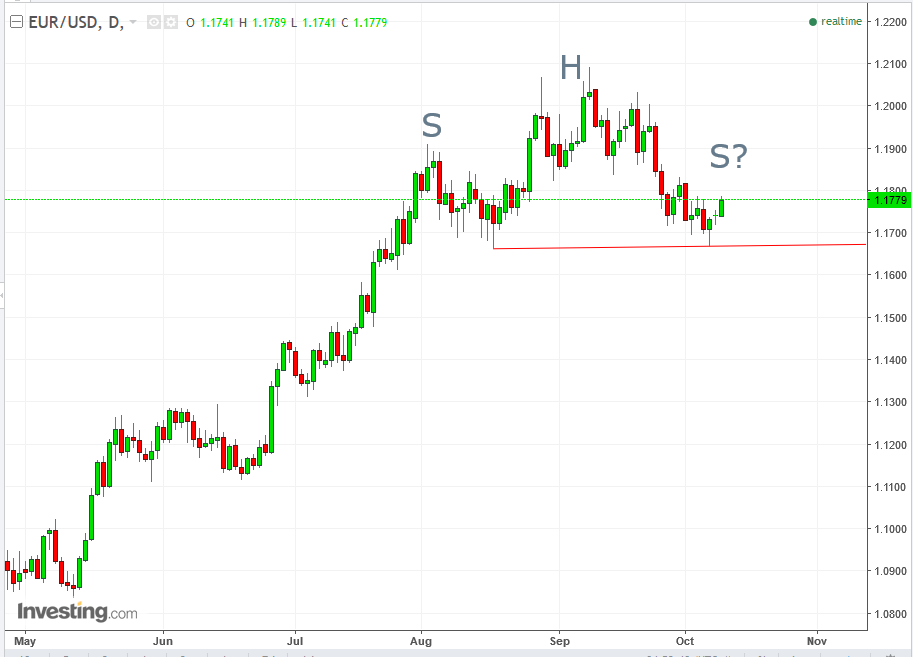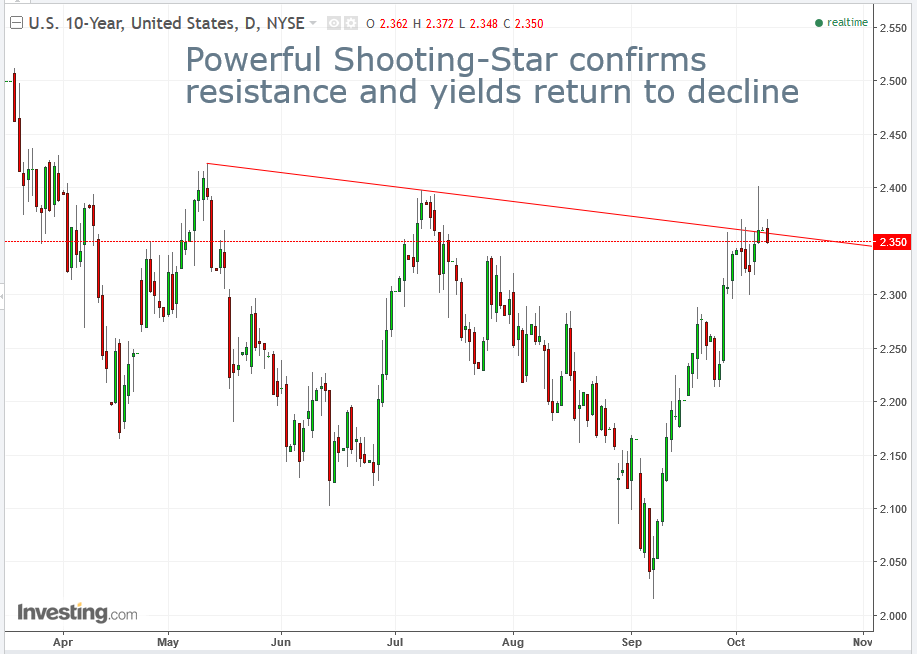Who is Kevin Hassett? Wolfe looks at the Trump ally tipped to become Fed Chair.
by Pinchas Cohen
Key Events
Yesterday, Spanish equities led European stocks higher, in direct contrast to the 3-percent plunge Madrid's benchmark IBEX 35 Index experienced after last week's not-officially-sanctioned Catalan referendum. Many suspect the recent advances could be knee-jerk buying off the dip.

This morning, as the IBEX once again headed lower, the possibility of reflexive trading is being reconsidered, after national benchmark indices across Europe were mixed, painting a murky picture lacking in leadership. With no clear leader, European stocks meandered, European bonds mostly extended declines and the common currency climbed for a third day, ahead of a pivotal meeting of Catalan’s regional parliament.
Global Market Affairs
The dollar fell against most major currencies while Treasuries remained steady, as investors await the Federal Reserve's minutes from its last meeting.
On the plus side, gold rose, and the dollar-denominated price of oil became cheaper for investors as the commodity held gains to just under $50 a barrel, ahead of Thursday's US government data, expected to show crude inventories fell for a third straight week.

Yesterday's biggest loser against the dollar, the Turkish lira, pared losses, as investors traded what they considered to be a buying dip, even after the US Ambassador to Turkey, John Bass, allowed for the diplomatic tiff to continue, when he said he “can’t predict” how long the row will last. Whatever the eventual outcome, a faster path to rising US rates would hit the lira when it's down.
The pound extended its recovery after last week’s slide, after UK Prime Minister Teresa May received open support from cabinet members for outlining a plan-B for leaving the EU unilaterally and without a deal. Another boost to sterling was a fourth straight month of gains for UK retail sales as well as this morning's strong manufacturing production read. Within a foreign exchange dynamic in which Cable has lost 12 percent of its value since the Brexit vote, higher retail sales is being driven by higher prices for imports, providing BOE officials with a reason to consider its first rate hike in decades.
Russian authorities this morning announced that they will block access to websites that sell or trade cryptocurrencies such as Bitcoin. According to Russian Central Bank First Deputy Governor Sergei Shvetsov, the digital currencies are "dubious."
In Japan, the TOPIX index registered its highest closing price since July 2007, perhaps signaling that investors have forgotten the Great Recession. Korean stocks played catch-up, after a week-long holiday resulted in markets being closed for the duration.
Up Ahead
- Minutes from the most recent Federal Reserve meeting are due Wednesday.
- API and EIA crude data are delayed to Wednesday and Thursday, respectively, because of Monday’s Columbus Day holiday in the US.
- The International Monetary Fund and World Bank hold their annual fall meetings this week.
- Earnings season begins on Thursday, led by major US banks JPMorgan Chase (NYSE:JPM), Citigroup Inc (NYSE:C); Bank of America(NYSE:BAC). and Wells Fargo (NYSE:WFC) report on Friday.
- The hyper-active Atlantic hurricane season will probably figure prominently in Friday's US data on retail sales and consumer prices.
Market Moves
Stocks
- The Stoxx Europe 600 Index fell less than 0.05 percent as of 8:33 a.m. London time.
- The MSCI All-Country World Index rose 0.2 percent.
- The U.K.’s FTSE 100 rose 0.1 percent.
- Spain’s IBEX fell 0.3 percent.
- The MSCI Emerging Markets Index jumped 0.6 percent, its highest in almost three weeks.
- S&P 500 Futures climbed 0.1 percent to 2,546.25.
Currencies
- The Dollar Index dipped 0.28 percent, to 93.45, where it stayed as of 4:26 EDT.

- The euro gained 0.2 percent to $1.1767, its strongest push higher in more than a week. Is a developing H&S pattern signaling an upside reversal is at hand?
- The British pound increased 0.2 percent to $1.3169.
- The Japanese yen rose 0.1 percent.
Bonds

- The yield on 10-year Treasuries climbed less than one basis point to 2.36 percent, the highest in three months. Technicals signal yields could be heading lower.
- Germany’s 10-year yield was unchanged at 0.44 percent, the lowest in two weeks.
- Britain’s 10-year yield increased one basis point to 1.365 percent.
Commodities
